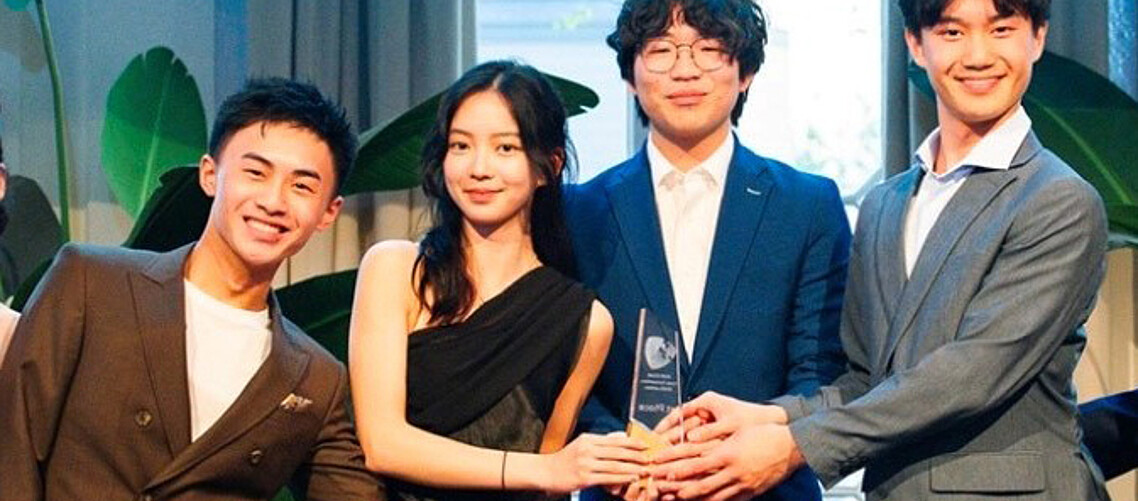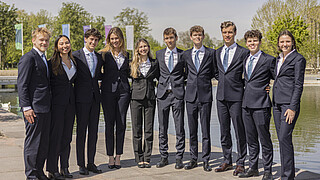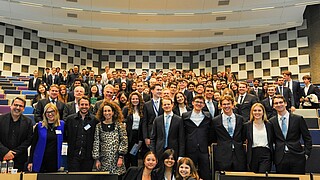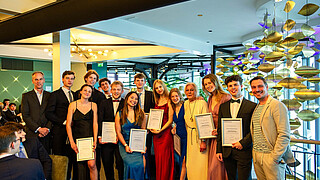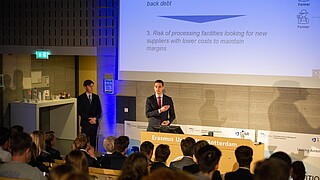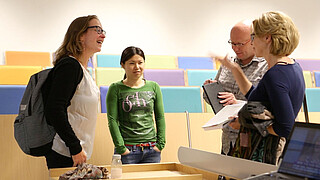The seven-day competition featured two business cases in packaging and motor controls, developed by RSM’s award-winning Case Development Centre (CDC). The competition included RSM’s own team, represented by students Ema Pitelova, John Mark Holst, Leonardo Maestri and Patricia Buchner.
After an introductory day, the 16 teams worked on a 12-hour case called ‘Gaining Ground – AuCom’s Strategic Entry into Asia’ before presenting their proposals to the jury the following day. Winners of the 12-hour AuCom case was Hong Kong University of Science and Technology. A couple of days later, the teams were given 24 hours to work on a second case, ‘Huhtamaki’s Strategic Dilemma: when being green isn’t enough’. The 24-hour case based on the fibre technology unit of Huhtamaki SMF Leeuwarden, Netherlands was won by Maastricht University.
The schedule for the visiting student teams included rest periods and a tour of Amsterdam, and concluded with final presentations on campus, followed by a closing gala at Rotterdam’s Wereldmuseum, where the winners were announced.
12-hour case: Gaining Ground: AuCom’s strategic entry into Asia
Motor control specialist AuCom is currently selling its motor controls to nine different industries, significantly mining, water, oil and gas, and maritime. Motor control plays an important role in protecting machinery. While AuCom’s experience in Asia is limited, it has three remote-working employees gathering market insights and building relationships – in China, India and South Korea – responsible for managing the broader East and Southeast Asian market. However, the fragmented approach and small team size make it difficult to scale operations efficiently. The student teams were asked to consider what scalable and resource-efficient expansion strategy should it pursue to secure a long-term market presence and a competitive advantage in Asia. It already favoured the idea of starting small with a pilot project in a carefully chosen region, using it as a testing ground before scaling across Asia. However, it required more thinking to develop an effective pilot project that could serve as a blueprint. The AuCom judges for the 12-hour case were Thomas Zirk-Gunnemann, CEO, and Frank Liermann, Business Unit Director; Hans Warten Sales Manager Europe; and Oliver Krämer.
24-hour case: Huhtamaki’s Strategic Dilemma: when being green isn’t enough
Packaging company Huhtamaki is evaluating where to focus its efforts and which products to develop in a constantly evolving market with rapid technological advancements, shifting legislation, and changing consumer demographics. The company aims not only to create better products – like coffee capsules made from tree fibres – but also to contribute to a more sustainable world. Its challenge is to achieve this while maintaining profitability. This 24-hour business case asked the student teams to propose where the company could focus its efforts and which products to develop, plus long, medium- and short-term roadmaps for a new strategy, the company’s value proposition, its competitors, and adaptations in their business model to meet market demands over the next 5–10 years. Students undertook a market analysis, its business model and developed roadmaps. The judges for the Huhtamaki case were Sanne Tiekestra, Irene Becerra, Paul Steenbergen, Alejandro Sciani, Wouter Kienstra and Alon Goldis.
Competing teams
Europe:
- Universidad de Navarra, Spain
- Maastricht University, Netherlands
- Universiteit van Amsterdam, Netherlands
- Corvinus University of Budapest, Hungary
- Rotterdam School of Management, Erasmus University, Netherlands
North America:
- HEC Montréal, Canada
- Smith School of Business, Queen’s University, Canada
- University of Florida, USA
- Kelley School of Business, Indiana University, USA
- USC Marshall School of Business, University of Southern California, USA
Asia and Oceania:
- National University of Singapore, Singapore
- The Hong Kong University of Science and Technology, Hong Kong
- Tsinghua University, China
- Ateneo de Manila University, Philippines
- Chulalongkorn University, Thailand
- University of Technology Sydney, Australia
